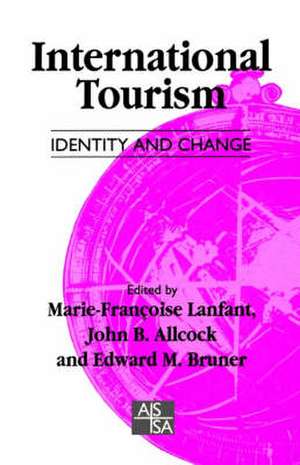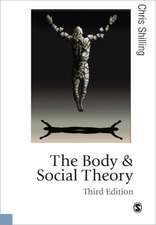International Tourism: Identity and Change: SAGE Studies in International Sociology
Editat de Marie-Francoise Lanfant, John B Allcock, Edward M Bruneren Limba Engleză Paperback – 14 aug 1995
Tourism is becoming an increasingly prominent feature of contemporary life. More of us travel for pleasure than ever before, yet the social scientific literature on tourism is relatively scant. This book provides an original contribution to the field of tourist studies.
The contributors to International Tourism reconceptualize the local and the global, avoiding such crude oppositions as centre v periphery, modern v traditional, macro v micro and North v South. Instead, they demonstrate that the local cannot be understood without the global, and that the global can never be isolated from the regional setting within which it operates.
Providing new insights into theories of touristic practice, this volume places tourism within the same framework as other transnational global studies.
Din seria SAGE Studies in International Sociology
-
 Preț: 107.18 lei
Preț: 107.18 lei -
 Preț: 104.13 lei
Preț: 104.13 lei -
 Preț: 379.40 lei
Preț: 379.40 lei -
 Preț: 134.42 lei
Preț: 134.42 lei - 15%
 Preț: 439.94 lei
Preț: 439.94 lei -
 Preț: 359.35 lei
Preț: 359.35 lei - 15%
 Preț: 429.11 lei
Preț: 429.11 lei -
 Preț: 434.31 lei
Preț: 434.31 lei - 15%
 Preț: 436.89 lei
Preț: 436.89 lei -
 Preț: 141.58 lei
Preț: 141.58 lei - 18%
 Preț: 1002.18 lei
Preț: 1002.18 lei - 15%
 Preț: 421.20 lei
Preț: 421.20 lei -
 Preț: 441.33 lei
Preț: 441.33 lei - 18%
 Preț: 1156.54 lei
Preț: 1156.54 lei - 18%
 Preț: 999.64 lei
Preț: 999.64 lei -
 Preț: 445.56 lei
Preț: 445.56 lei - 15%
 Preț: 429.11 lei
Preț: 429.11 lei -
 Preț: 168.69 lei
Preț: 168.69 lei -
 Preț: 153.12 lei
Preț: 153.12 lei -
 Preț: 144.85 lei
Preț: 144.85 lei - 18%
 Preț: 1195.55 lei
Preț: 1195.55 lei - 23%
 Preț: 1224.41 lei
Preț: 1224.41 lei - 18%
 Preț: 989.72 lei
Preț: 989.72 lei -
 Preț: 134.83 lei
Preț: 134.83 lei - 18%
 Preț: 1054.75 lei
Preț: 1054.75 lei - 15%
 Preț: 432.08 lei
Preț: 432.08 lei - 15%
 Preț: 429.62 lei
Preț: 429.62 lei -
 Preț: 272.01 lei
Preț: 272.01 lei -
 Preț: 272.01 lei
Preț: 272.01 lei
Preț: 467.99 lei
Preț vechi: 550.57 lei
-15% Nou
Puncte Express: 702
Preț estimativ în valută:
89.55€ • 93.83$ • 74.03£
89.55€ • 93.83$ • 74.03£
Carte tipărită la comandă
Livrare economică 12-26 aprilie
Preluare comenzi: 021 569.72.76
Specificații
ISBN-13: 9780803975132
ISBN-10: 0803975139
Pagini: 256
Dimensiuni: 138 x 216 x 15 mm
Greutate: 0.33 kg
Ediția:1
Editura: SAGE Publications
Colecția Sage Publications Ltd
Seria SAGE Studies in International Sociology
Locul publicării:London, United Kingdom
ISBN-10: 0803975139
Pagini: 256
Dimensiuni: 138 x 216 x 15 mm
Greutate: 0.33 kg
Ediția:1
Editura: SAGE Publications
Colecția Sage Publications Ltd
Seria SAGE Studies in International Sociology
Locul publicării:London, United Kingdom
Recenzii
`This book is one of several indications that the sociology of tourism is on the move.... these articles raise relevant important themes in the study of tourism.... The contributors to this very readable book provide valuable insights, many of which have been derived from empirical research, that should interest anyone involved in the study of international tourism. And by moving us away from polarised positions over the social impact of tourism toward more complex but also more considered perspectives they have also helped alter the agenda for future research' - David Harrison, University of Sussex
Cuprins
Introduction - Marie-Françoise Lanfant
International Tourism, Internationalization and the Challenge to Identity - Marie-Françoise Lanfant
Cultural Heritage and Tourist Capital - Michel Picard
Cultural Tourism in Bali
Textiles, Memory and the Souvenir Industry in the Andes - Anath Ariel de Vidas
Frontier Minorities, Tourism and the State in Indian Himalaya and Northern Thailand - Jean Michaud
International Tourism and the Appropriation of History in the Balkans - John B Allcock
Industrial Heritage in the Tourism Process in France - Claude-Marie Bazin
Tourism and Tradition - Wendy Williams and Elly Maria Papamichael
Local Control versus Outside Interests in Greece
The Jewish Pilgrim and the Purchase of a Souvenir in Israel - Shelley Shenhav-Keller
International Tourism and Utopia - Danielle Rozenberg
The Balearic Islands
Life as a Tourist Object in Australia - Meaghan Morris
Sex Tourism and Traditional Australian Male Identity - Suzy Kruhse-MountBurton
The Anthropologist as Tourist - Malcolm Crick
An Identity in Question
The Ethnographer/Tourist in Indonesia - Edward M Bruner
International Tourism, Internationalization and the Challenge to Identity - Marie-Françoise Lanfant
Cultural Heritage and Tourist Capital - Michel Picard
Cultural Tourism in Bali
Textiles, Memory and the Souvenir Industry in the Andes - Anath Ariel de Vidas
Frontier Minorities, Tourism and the State in Indian Himalaya and Northern Thailand - Jean Michaud
International Tourism and the Appropriation of History in the Balkans - John B Allcock
Industrial Heritage in the Tourism Process in France - Claude-Marie Bazin
Tourism and Tradition - Wendy Williams and Elly Maria Papamichael
Local Control versus Outside Interests in Greece
The Jewish Pilgrim and the Purchase of a Souvenir in Israel - Shelley Shenhav-Keller
International Tourism and Utopia - Danielle Rozenberg
The Balearic Islands
Life as a Tourist Object in Australia - Meaghan Morris
Sex Tourism and Traditional Australian Male Identity - Suzy Kruhse-MountBurton
The Anthropologist as Tourist - Malcolm Crick
An Identity in Question
The Ethnographer/Tourist in Indonesia - Edward M Bruner
Descriere
International Tourism reconceptualizes the local and the global, avoiding such crude oppositions as centre v periphery, modern v traditional and North v South, demonstrating that the local cannot be understood without the global, and that the global can never be isolated from the regional setting within which it operates.









